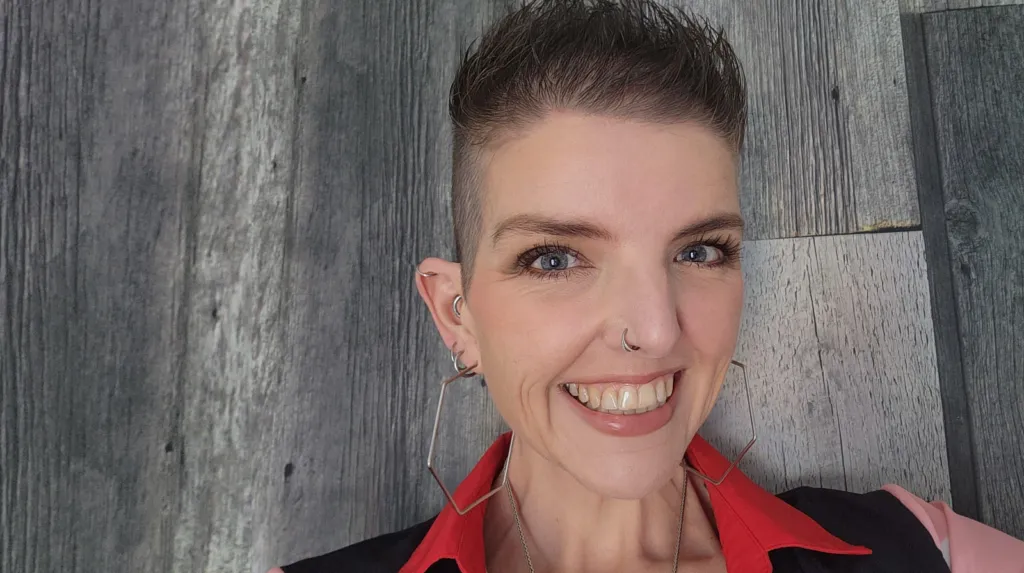
Keynote speaker and mental health advocate Jessica Ward-King says opening up about her mental health challenges in a public way was a difficult decision.
“It was terrifying, but it was also very liberating because then when people ask me, ‘how are you doing?’ I could actually say, ‘not so great,’ and there would be an understanding there.”
Ward-King has adopted the moniker the stigmacrusher and has shared her experiences with bipolar disorder. In a piece that appeared recently on the website of the Mental Health Commission of Canada, she addressed ‘unmasking mental health’ the theme of the Canadian Mental Health Association’s mental health week 2025.
Ward-King says that while her experience sharing mental health challenges has been positive, there is nuance to the idea.
“It is not always safe or appropriate to drop the mask. Masking is a very valid tactic, or way of living to protect oneself, to protect the things that one has and has achieved, there is stigma,” she said. There can be negative consequences. I’ve had the advantage of, of not really experiencing those negative consequences in my career…but I do know people who have, and so it’s not always appropriate to drop the mask.”
She says people can use strategies like paying close attention to the language others are using around mental health to gauge whether or not a space is safe to disclose in.
“You can also test the waters a little bit by kind of floating something out there, like saying something, whether it’s true or not, something, like, ‘oh, my aunt was in a psychiatric facility’. And see how people react to that,” she said. “If they’re like, ‘oh my gosh. Do you let your children go over there?’ then, you know, not necessarily the safest environment.”
She says it can also be easier to ‘unmask’ in a one on one setting with someone you trust. For people on the receiving end of someone opening up to them about mental health challenges, Ward-King says language can be a good way to signal to someone that it’s safe to talk about mental health.
“ We don’t always know exactly what are the politically correct terms, but just be cognizant of the language you’re using,” she said.
Ward-King says it’s especially important to avoid using the names of psychiatric diagnoses like bipolar or obsessive compulsive disorder in a flippant manner.
“Be sensitive to the fact that the person that you’re talking to may have a lived experience of mental illness or may, and definitely does have someone in their life that they love, that has experience of mental illness.”
She says people can help create space for conversations about mental health by not being afraid to follow up on the perfunctory “I’m fine”, as long as it doesn
“It’s absolutely okay to say, ‘yeah, okay, but how are you really? You know, underneath it all, how are you really?’ And that person then has the opportunity, they can say, ‘no, no, I’m fine.’ And, and you can believe them or not, but, but you can just continue on,” she said.
“Prying is not a very good tactic here. Like saying, ‘okay, how are you really?’ And they continue to say, ‘I am fine.’ …give that person enough grace to decide for themselves whether they want to unmask or not, but just opening it up, giving that that little wedge in the door can be so instrumental. And I’ve even found that when I’ve been hesitant to come out to a colleague, if I get that opening, it makes it so much easier, so much more natural to be able to unmask.
During the interview, Ward-King shared some of her experiences dealing with bipolar disorder, which for years she was dealing with while having a different diagnosis.
“ I’ve lived with bipolar disorder since I was a teenager, and it was first misdiagnosed because I never went to the doctor when I was feeling manic, when I was feeling really good and had lots of energy,” she said. “I went to the hospital when I was severely depressed, and so I was originally misdiagnosed for years and years with major depressive disorder. And the treatments for the two disorders are quite different. And so my disorder was made worse by the treatments I was receiving for the major depressive disorder at that time.”
Ward-King says it’s important people listen when someone is telling them about a personal experience of mental illness, and understand that not everyone with the same diagnosis will have the same experience of a condition.
“My bipolar is not gonna look the same as Selena Gomez’s bipolar disorder or you know, any other of the stars that have come out and said they have bipolar disorder, they’re going to look very different,” she said.
She says it’s important people are aware of the 988 suicide crisis line and corresponding website which provide support, including resources for people who may be concerned about loved ones.
